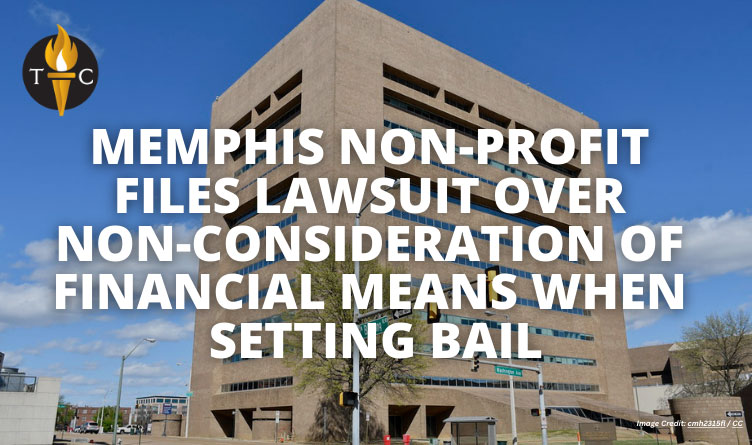Image: Walter L. Bailey, Jr. Criminal Justice Center (Memphis, Tennessee) Image Credit: cmh2315fl / CC
The Tennessee Conservative Staff –
A Memphis-area non-profit is suing Shelby County officials over a new state law that prohibits a judge from taking an individual’s financial situation into consideration when setting bail.
Just City, a non-profit group that works towards what they call “criminal justice reform,” filed suit in the U.S. District Court for the Western District of Tennessee last Wednesday. Named in the suit are the Shelby County Sheriff’s Office, Shelby County judicial commissioners, and General Sessions Court Judge Bill Anderson.

The lawsuit asks that a federal judge rule that the new state law is unconstitutional. Additionally, they want the SCSO to be prohibited from enforcing any bail orders that did not take the defendant’s ability to pay into consideration.
The new law was sponsored by State Senator Brent Taylor (R-Memphis-District 31) and State Representative John Gillespie (R-Memphis-District 97). It was passed earlier this year and went into effect on May 1.
Just City activists say the new law creates a “discriminatory wealth-based detention.” Besides holding individuals in jail because of an inability to meet their bail, it also could potentially allow someone with more financial resources to be released, despite potential safety and flight risk issues.

“You could be a wealthy person charged with a violent offense, and if you are concerned with keeping that person in custody with a bail, you need to know how much they can pay you,” said Just City Executive Director Josh Spickler.
Previously, judges and judicial commissioners used an “ability-to-pay calculator” to set an affordable bail, specifically in cases where the intention was to release the defendant. In cases where a defendant was to be kept in jail before a trial, a higher bail was set.

Stella Yarbrough, legal director for the ACLU of Tennessee, also argues that not factoring in a person’s ability to pay could potentially impact the outcome of a case.
“One person gets the benefit of being released, being able to work on their case, retain an attorney, find their witnesses, and prove their innocence,” Yarbrough said. “In fact, [that person] has a greater presumption of innocence because they are coming into court in their own clothes, on their own volition, rather than in an orange jumpsuit and handcuffed.”
According to Spickler, there is no other state with a similar law in place.




One Response
As dear Mom, RIP, oft said, “The road to hell is paved with good intentions”.
Dimmercraps are and love their criminals.